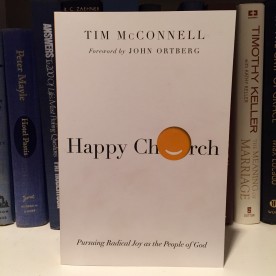A lot of people like Christ. It’s the Christians who can sometimes be less…appealing.
Why is that? Well maybe, for starters, it’s because Christians are people. But according to author Tim McConnell, there’s more. In his view, one of the main reasons why folks aren’t all that attracted to Christians is that Christians (and Christian churches, especially) are just not all that happy.
I get that. When Robbie and I were newlyweds, we volunteered to teach Sunday School for a spirited group of fourth graders. Sometimes we’d play a version of Pictionary where the kids would draw things from that week’s lesson (Daniel’s lions, Jonah’s whale, ten scabby lepers) on the chalkboard. The contest always provoked a lot of giggling, and sometimes the cheering could get a little loud.
One Sunday, our door burst open. It was the teacher from the next class over, and she was clearly not happy. “What on EARTH is going on in here?” she scolded, stomping her feet. “STOP it! Don’t you know this is GOD’S house?!”
Eek. Robbie and I were barely out of college. We had no idea that God didn’t like Pictionary. Or laughter.
McConnell is all about laughter – and he says that God is, too. And hope. And joy, even in the midst of pain or suffering. Which is interesting, given McConnell’s pedigree. He’s a Presbyterian minister who is not, by his own admission, “naturally happy.” (He brought Kierkegaard’s The Sickness Unto Death along on his honeymoon.) But on the theory that our moods are often the product of our attentions and activities, McConnell has chosen to “embrace the practice of happiness.”
 And, in his new book Happy Church, he invites us to do the same.
And, in his new book Happy Church, he invites us to do the same.
For some churches, that may require a shift in the way we approach some of our most familiar disciplines. For example, McConnell believes that Bible reading (a regular part of most churches’ liturgy, regardless of the overall worship style) should be a breeding ground for gladness. Churches that are pursuing what McConnell calls “radical joy” encourage listeners to try a verse on, to use and obey it in everyday life, take it out for a test drive, if you will. In happy churches, the Word is not just read. It works.
Likewise, McConnell says, the happy church sings. You might read that line and think, “Not me.” But if you do, you’re missing out. McConnell points to what he calls the “divine bounce” (God reveals glory; we return praise) and he has a boatload of research that points to both the rightness and the necessity of singing. It doesn’t matter whether the tunes are “psalms, hymns or spiritual songs” (Colossians 3:16), McConnell says that when God’s Spirit shows up, songs happen.
(And just as a sidebar here, I wish McConnell had interviewed me for his book. When it comes to singing – or doing much of anything – our family mottos is: If you lack talent, use enthusiasm.)
McConnell serves up plenty to chew on (and yes, there’s a chapter on eating), but my favorite section is the one on prayer. When the church prays, he says, “We are pulled out of our loneliness into active community, we are connected to God and feel his presence, and our prayers are fulfilled when we see the activity of God connected to our prayer life.”
I like that.
And I like the way the book wraps up, with a challenge to modern day churchgoers to stop squabbling about things like pews, worship styles, or other polarizing issues and start advocating for happiness. Because when it comes to being a beacon of gladness in a world that desperately needs a reason to rejoice, McConnell tips his hat to the Beastie Boys. It was true in 1986, and it’s still true today:
(You gotta) Fight for Your Right (to Party!).














